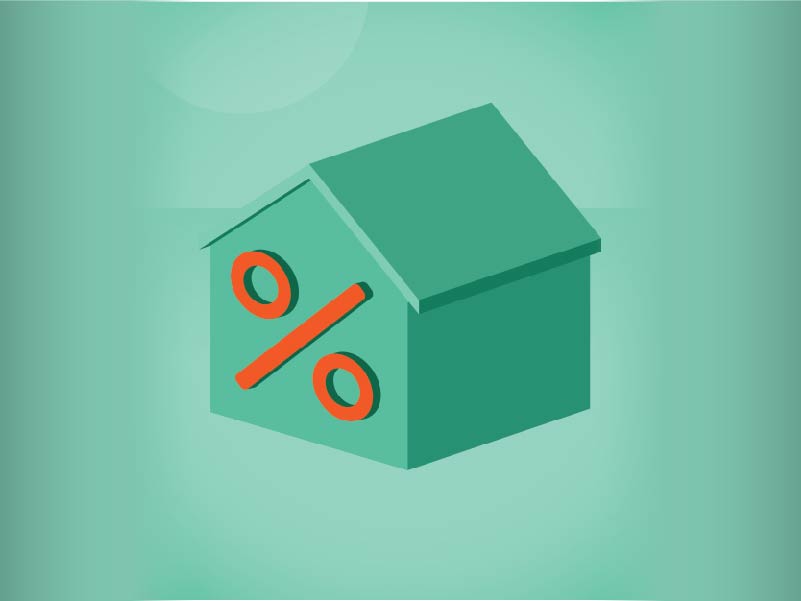FDIC-Insured - Backed by the full faith and credit of the U.S. Government
-
-
-
FNBO
Mortgage
Date Published: October 01, 2018
-

Interest Rate vs. APR: What's the Difference?
Those shopping for a home – especially when researching online – have probably come across terms like “interest rate,” or “APR.” Are they different? Are they terms a potential homebuyer should understand?
Yes, and yes.
Let’s start with interest rate, which is a fixed or variable percentage that a lender, such as a bank, gives a homebuyer for his or her home loan.
“The interest rate is the cost you will pay each year to borrow the money, expressed as a percentage rate. It does not reflect fees or any other charges you may have to pay for the loan,” says consumerfinance.gov.1
The APR (Annual Percentage Rate) is a broader measure of the cost for borrowing money to buy a home, and it’s also expressed as a percentage rate. Generally speaking, the APR reflects not only the interest rate but also any mortgage broker fees, points and other charges that you pay to get the loan. For that reason, your APR is usually higher than your interest rate.
Understanding A Mortgage
A mortgage payment is made up of the principal and the interest for the loan. The principal is the money you borrowed from the bank to buy the home, and the interest is the percentage-based fee that you pay for borrowing the money. Thus, paying a principal amount reduces the amount you owe, while an interest rate does not.
If you aren’t sure of the difference between fixed or adjustable interest rates, you’re not alone. 22 percent of respondents in a survey conducted by FNBO didn’t know the difference, either.
“Rates can be fixed or adjustable. A fixed rate never changes, but the rate for an adjustable rate mortgage (an “ARM”) can adjust higher or lower (based on an index) while you have your loan,” says creditkarma.com.2
“If your rate adjusts, your monthly payment will change. Adjustable rate mortgages typically have caps that limit how much and how often they can change. Most adjustable rate mortgages have a rate that’s fixed for a number of years and then can adjust.”
The rates you are offered differ depending on a handful of factors, says Alan LaFollette, Vice President, Home Lending at FNBO.
“How much you want to borrow; how much you’ve saved for a down payment; whether or not you have a history of paying your bills on time; the type of loan you choose – these are some of the things that help determine what kind of a rate you will receive.”
When you apply for a loan, the rates you’re offered can be either floating or locked. A floating rate can change before you close your loan. A locked rate shouldn’t change for 30, 45 or 60 days, depending on how long your rate lock lasts.
Monthly Payment vs. Overall Cost
With interest rate versus APR, “the main difference is that the interest rate calculates what your actual monthly payment will be,” Sean O. McGeehan, a mortgage sales manager in Chicago, tells bankrate.com. “The APR calculates the total cost of the loan. A consumer can use one or both to make apples-to-apples comparisons when shopping for loans.”3
To put it simply, a loan with a 4 percent interest rate will have a lower monthly payment than a loan with a 5 percent interest rate (assuming the terms of both loans are identical). The same goes for an APR. The total cost of the loan with a 4 percent APR will be less than a loan with a 5 percent APR.
How long do you plan to live in the house?
If you don’t plan on living very long in the home you’re buying, it might make sense to pay fewer upfront fees and get a higher interest rate (and higher APR) because the total cost will be less over the first few years.
However, if you plan to stay in the home for 30 or more years, it might make more sense to take out a loan that has the lowest APR because you’ll end up paying a lower amount for your home.
“We know that some of this can get confusing, and we’re happy to explain every step of the process along the way,” says FNBO's LaFollette. “No one should feel intimidated or overwhelmed during the homebuying process.
“This is why homebuyers love working with us – we never get tired of questions; that’s why we’re here.”
Got Questions? Stop by your local FNBO branch today and visit with a mortgage loan expert.
1 What is the difference between a mortgage interest rate and an APR? - https://www.consumerfinance.gov/ask-cfpb/what-is-the-difference-between-a-mortgage-interest-rate-and-an-apr-en-135/
2 What’s the difference between a mortgage rate and APR? – https://www.creditkarma.com/home-loans/i/mortgage-rate-vs-apr/
3 The difference between interest rate and annual percentage rate, or APR – https://www.bankrate.com/finance/mortgages/apr-and-interest-rate.aspx
The articles in this blog are for informational purposes only and not intended to provide specific advice or recommendations. When making decisions about your financial situation, consult a financial professional for advice. Articles are not regularly updated, and information may become outdated.
